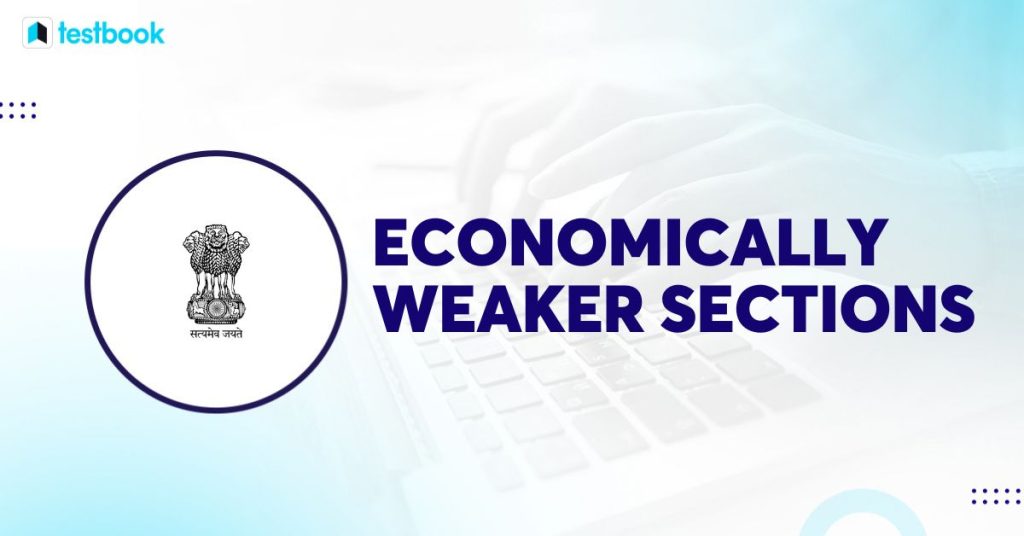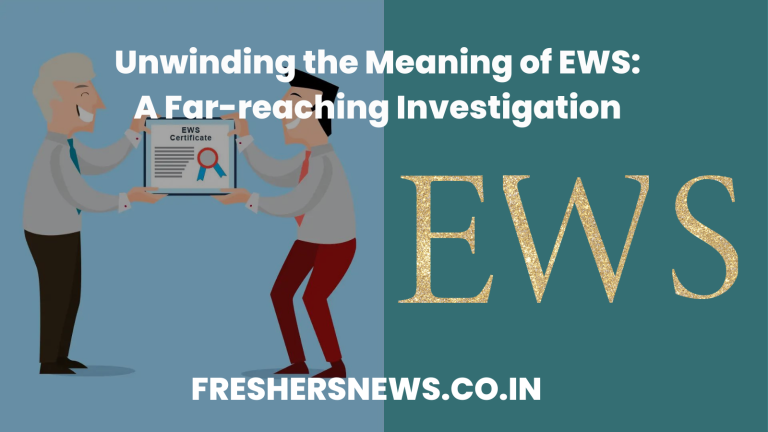Introduction :
In the current multi-layered financial scene, where abbreviations and trunciations flourish, “EWS” remains of principal significance, especially in the Indian setting. EWS, with its different translations across different areas, holds a vast spot basically as a condensing for “Monetarily More Vulnerable Segments.” In this talk, we set out on a top-to-bottom excursion to comprehend this term’s nuanced suggestions, applications, and discussions. We are talking about Unwinding the Meaning of EWS: A Far-reaching Investigation.

We are talking about Unwinding the Meaning of EWS: A Far-reaching Investigation:
Economically Weaker Sections (EWS): A Detailed Definition
Economically Weaker Sections (EWS) embody a section of the populace outlined by their monetary conditions, portrayed by low pay and limited admittance to principal conveniences and assets. This grouping fills in as a crucial device in tending to financial differences by coordinating designated mediations and government assistance measures toward elevating underestimated segments of society. Beginning with the economic approaches of post-freedom India, the idea of EWS highlights the country’s obligation to cultivate comprehensive development and impartial appropriation of assets.
Advancement and Setting
The Economically Weaker section’s worldview advancement aligns with India’s excursion toward the financial turn of events and destitution lightening. Throughout the long term, administrative drives and projects have been fastidiously created to enable EWS people to group and improve destitution-initiated difficulties. These drives range a wide range of areas, including schooling, medical services, lodging, and business, with the overall target of encouraging financial turn of events and restricting the gap among remarkable and minimized portions of society.
Distinguishing proof Rules and Problems
The method involved distinguishing people having a place with the monetarily more fragile segments facing critical difficulties inferable from the multi-layered nature of poverty and the shortfall of a normalized measurement for checking financial hardship. Different boundaries, for example, pay levels, resource proprietorship, and family use, are commonly viewed in deciding EWS status. Notwithstanding, the viability of these standards stays antagonistic, with worries approaching over precision, straightforwardness, and defenselessness to control.
Administrative Intercessions and Attempts
Legislatures at both focal and state levels in India have led a horde of plans and strategies to tend to the necessities of Monetarily More fragile Segments. These drives include instruction, medical care, lodging, monetary incorporation, and expertise improvement. Significant undertakings like the Pradhan Mantri Awas Yojana (PMAY), Ayushman Bharat, Public Provincial Job Mission (NRLM), and Pradhan Mantri Jan Dhan Yojana (PMJDY) embody coordinated endeavors to elevate the EWS people group and cultivate their combination into the standard economy.
Effect and Adequacy
The effect of administrative intercessions focusing on Monetarily More fragile Segments appears across different areas and districts, dependent upon variables like execution productivity, asset assignment, and local area commitment. While these drives have improved admittance to fundamental administrations and conveniences for many underestimated people, challenges concerning inclusion, quality, and manageability persevere. Moreover, the drawn-out viability of such mediations in destroying destitution and advancing comprehensive improvement remains a subject of continuous examination and assessment.
Debates and Reactions
The idea of Financially More Vulnerable Segments isn’t absent any contentions and reactions, with doubters scrutinizing its adequacy in tending to dug-in financial aberrations. Pundits battle that the selective spotlight on monetary models ignores different components of depreciation, like station, orientation, nationality, and topographical area, sustaining disparity and rejection. Also, concerns loom over the expected abuse of EWS reservations and advantages by well-off people taking on the appearance of being financially impeded, consequently denying certified recipients of much-required help.
Future Directions and Difficulties
As India explores its direction towards a comprehensive and manageable turn of events, tending to the financial necessities of Monetarily More vulnerable Segments remains a fundamental worry for policymakers and partners. Refining and sustaining distinguishing proof rules, reinforcing execution instruments, and upgrading observing and assessment structures are primary to guarantee the adequacy and value of mediations focusing on the EWS people group. Besides, encouraging more noteworthy cooperative energy between administrative drives, common society associations, and confidential area partners can intensify the effect of intercessions and speed up progress toward acknowledging comprehensive development and civil rights.
FAQs
What does EWS stand for?
EWS represents Economically Weaker Sections. It alludes to a fragment of the populace portrayed by low pay and restricted admittance to essential conveniences and assets.
What is the meaning of EWS in India?
EWS holds critical significance in India as it fills in as a model for deciding qualifications for different government plans, endowments, and reservations pointed toward tending to financial variations and elevating underestimated segments of society.
How are people recognized as having a place in the EWS category?
Distinguishing proof of EWS people regularly includes evaluating boundaries, for example, pay level, resource proprietorship, and family use. Nonetheless, the interaction faces difficulties because of the multi-layered nature of neediness and the absence of a normalized measurement.
What are a few legislative drives focusing on the EWS people group in India?
A few legislative drives and projects are pointed toward tending to the requirements of the EWS people group, spreading over areas like instruction, medical care, lodging, monetary consideration, and expertise improvement. Models incorporate the Pradhan Mantri Awas Yojana (PMAY), Ayushman Bharat, and Pradhan Mantri Jan Dhan Yojana (PMJDY).
What effect do administrative mediations have on EWS communities?
Administrative intercessions have further developed admittance to fundamental administrations and conveniences for a massive number of people who are underestimated. Be that as it may, challenges continue concerning inclusion, quality, and maintainability.
Are there any reactions or debates encompassing the idea of EWS?
Indeed, pundits contend that zeroing in exclusively on financial measures neglects different depreciation elements, like position, orientation, nationality, and topographical area. Moreover, concerns exist concerning princely people’s possible abuse of EWS reservations and advantages.
What are in-store prospects and difficulties related to tending to the requirements of EWS communities?
Future possibilities involve refining ID measures, upgrading execution systems, and cultivating more prominent cooperative energy between legislative drives, common society associations, and confidential area partners. Challenges include guaranteeing intercessions’ adequacy and value and tending to long-haul supportability.
How could people add to the strengthening of EWS communities?
People can contribute by upholding comprehensive approaches, supporting associations pursuing the upliftment of the EWS people group, and advancing mindfulness about financial aberrations and the significance of the impartial turn of events.
Could EWS drives at any point cultivate comprehensive development and social justice?
Indeed, by taking on a comprehensive methodology incorporating monetary, social, and social elements of minimization, EWS drives can cultivate complete development and make a more evenhanded and prosperous society for all residents.
Where could people access more data about EWS and related initiatives at any point?
People can get data about EWS and related drives through administrative sites, official reports and distributions, and respectable non-legislative associations (NGOs) working in financial turn of events and lack easing.
Conclusion
Economically Weaker Sections (EWS) exemplify an essential portion of society requiring designated mediations and support to conquer financial hindrances and open their dormant potential. While legislative drives and arrangements have taken praiseworthy steps in tending to the necessities of the EWS people group, challenges continue concerning recognizable proof precision, execution effectiveness, and long-haul maintainability. By embracing an all-encompassing and complex methodology that incorporates monetary, social, and social elements of minimization, India can impel a comprehensive turn of events and produce a more evenhanded and prosperous society for every one of its residents.

